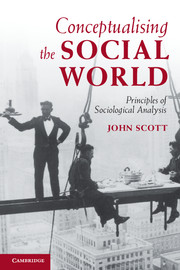Conceptualising the Social World
This comprehensive and authoritative statement of fundamental principles of sociological analysis integrates approaches that are often seen as mutually exclusive. John Scott argues that theorising in sociology and other social sciences is characterised by the application of eight key principles of sociological analysis: culture, nature, system, structure, action, space-time, mind and development. He considers the principal contributions to the study of each of these dimensions in their historical sequence in order to bring out the cumulative character of knowledge. Showing that the various principles can be combined in a single disciplinary framework, Scott argues that sociologists can work most productively within an intellectual division of labour that transcends artificial theoretical and disciplinary differences. Sociology provides the central ideas for conceptualising the social, but it must co-exist productively with other social science disciplines and disciplinary areas.
- Overcomes the fragmentation and division often associated with this subject
- Goes beyond the usual, standard sources and theorists to engage with wider arguments from a range of countries
- Provides an authoritative, detailed and accurate range of source references on key ideas
Reviews & endorsements
'Conceptualising the Social World is an ambitious book with many of the chapters having the potential to be stand-alone, perhaps in university course readers for undergraduates. Of particular worth is its vision for sociology as a unified and powerful discipline with the power to range over far and wide social issues. Now it remains for the sociologists to take on board Scott's challenge.' Thomas Birtchnell, Sociology
'John Scott has written a rich and impressive work of theoretical exegesis and synthesis, drawing upon a compendious knowledge of the development of the social sciences. Its central chapters describe the evolution of eight fundamental concepts (culture, nature, system, space-time, structure, action, mind, development) … The book contains admirably lucid and concise summaries of the establishment and elaboration of these key concepts.' Alan Warde, Sociology
'One notable feature of Scott's book is his determined invocation of a wide and historically deep range of thinkers when considering each sociological principle. Some of these thinkers are well known - Parsons gets a lengthy treatment in the chapter on system, Freud and Mead are discussed in the chapter on mind. But many others are less familiar, at least within a sociological context … The appearance of such unusual suspects may well inspire readers to delve into the past in a way that enriches their own work.' Stephen Kemp, Sociology
Product details
June 2011Paperback
9780521711364
344 pages
228 × 152 × 15 mm
0.54kg
4 b/w illus.
Available
Table of Contents
- 1. Diversity and continuity in social theory
- 2. Culture: the socialisation of meaning
- 3. Nature: conditions and constraints
- 4. Systemic processes: regulation and control
- 5. Space-time: forms and practices
- 6. Social structure: institutions and relations
- 7. Social action: interpersonal and collective
- 8. Subjects: socialised minds
- 9. Social development: differentiation and change
- 10. Conclusion.






